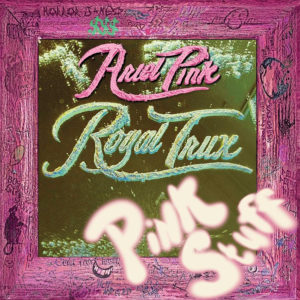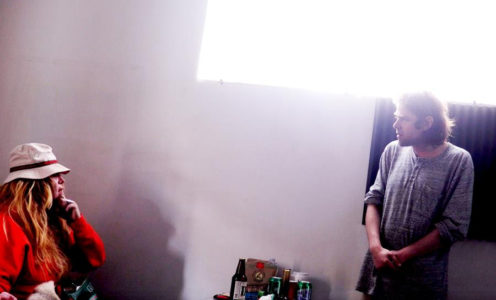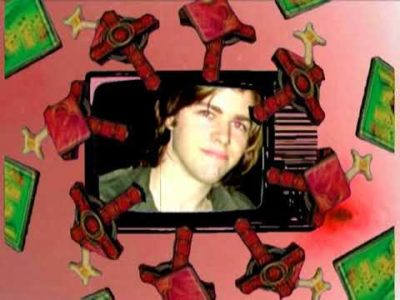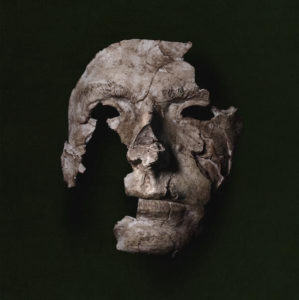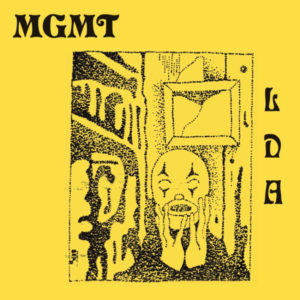Our interview with Crush DLX
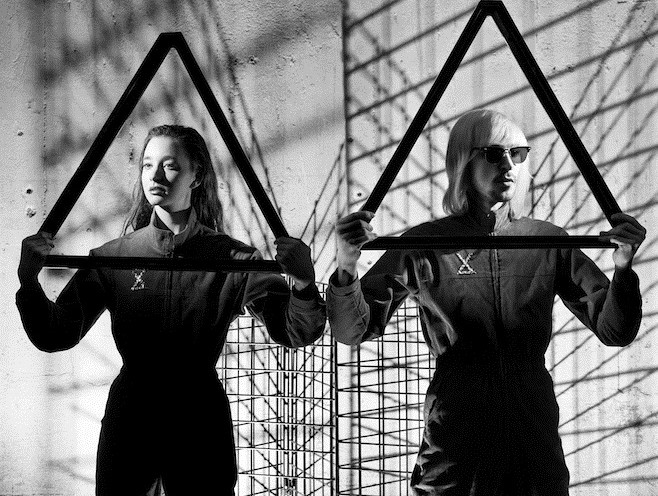
Crush DLX is a musical partnership formed by the joining together of two very provocative personalities, Pop Levi and Bunny Holiday. Bunny is a model and designer for American Apparel, whose icon-busting take on Southern California imagery is both playful and edgy. Pop Levi is an indie music perennial, a producer and multi-instrumentalist. He’s been part of Super Numeri, Ladytron, and The Emergencies. He’s possibly best known for his solo album The Return to Form Black Magick Party. Self-produced and recorded in various locations around the world, Pop Levi toured the album in the US, UK, Europe and Australia, which led to Lauren Laverne naming him on the UK’s The Culture Show as one of her favorite artists. He also wrote and produced the Childish Gambino song “The Party” for his album Because the Internet, one of the nominees for Best Rap Album at the 2015 Grammy Awards. His latest creative endeavor is the Micro Sex Tapes 370 project. Experimental and intuitive, the project releases a new song every day on the Crush DLX SoundCloud for 370 days. Nearly halfway through, and they’ve already collaborated with Ariel Pink on one of the tracks, “My Pleasure”, and plans are in the works for other musical hook-ups, possibly including members of Cabaret Voltaire and Duran Duran. Alice Severin spoke to the extremely charming Pop Levi and Bunny Holiday about their inspirations, how to get your cassette into an Oscar goodie bag, and what it takes to release a song every day.
NT: How are you and where are you?
PL – Good, very good. We’re sitting, lying on the bed looking at the sun coming in.
NT: That sounds nice.
PL: It’s averagely warm for LA but not too hot today.
NT: Ok, make me jealous – how warm is it?
PL: It’s 72. Not too bad.
NT: We’re getting snow now.
PL: How lovely!
NT: So how did you come up with the project – Crush DLX and Micro Sex Tapes 370 – how did this all happen?
PL: Well, we’ve been together as a duo quietly making recordings on cassette for maybe four years. And we came up with such a wealth of recordings and ideas that we didn’t even know what we wanted to do with them. And then one day we thought, why don’t we spend a year working on them every day and releasing them, as we kind of put touches to them so it kind of feels fresh to us. And once we started the idea, it kind of built into something and we started to get a bit of play on it. Yeah, so that’s how it started.
NT: So these are songs you’ve been working on for quite a while but now are returning to.
PL: Not always. Sometimes we might make some that are very fresh.
BH: Yeah, very very fresh.
PL: It’s kind of built on the recordings that were made and mostly over the last year.
BH: We’re just recording every day.
PL: If we haven’t done the once a day, then, for example, today, we’ll look through the catalogue for one we haven’t posted, find one we like, and add things that we think of, whatever finds us today. The idea of it is to keep it dirty and sketchy on purpose, as opposed to making a final polished product album. Both of us are really turned on by…the idea of doing it, of giving people a music series rather than a polished album. Like, watch us make it with all the faults and all the good things. Like music should be, I think.
NT: More spontaneous.
PL: Yeah, it’s real pure. It’s definitely not like a studio album. I guess that’s what we like about it. At some point, at the end, we’re going to comb through the best bits and make a proper album
NT: I was going to ask, is this something that you’re going to be playing live?
PL and BH: Yeah, we’ve already been playing live.
PL: We’ve been playing a night which is run by radio station KCRW called School Night. They do this night every Monday, and it’s a really kind of prestigious up and coming showcase of projects. We’re playing that in April.
NT: And your tape is being given away in the Oscars goodie bag?
PL: Yeah, yeah we’re the only music in there – we’re really lucky.
NT: Did someone approach you, or did you know someone? How does that happen? How do you get to be in a goodie bag?
PT: We knew a secret, special person. (laughs) And we showed it to them and they said oh that looks nice! I think they preferred it to the idea of putting CDs in and that – it’s kind of passé. And we thought, let’s make a cassette.
NT: After albums, now cassettes seem to be making a comeback. I saw they are selling them in Rough Trade.
PT: I love Rough Trade – I love it. I love the store and the label.
NT: I think you two are the first people who have done something like this, releasing a song every day?
PT and BH: Yeah, I hope so.
PT: I’ve heard that some people wanted to do it, but I don’t think anybody actually went ahead and did it.
NT: You’ve got some back catalogue – do you ever have days where it’s difficult to choose? Why did you choose today’s song? Yesterday’s song was “Chocolates” – right?
PT: There’s so many. I think we’ve got like right now, another 200 tracks to choose from, so. We just spin off and get a vibe.
BH: Yeah, whatever we’re vibing on.
PT: We’ll go, oh that one sounds good today. Then we work on it for a couple of hours.
NT: So what is the recording process like? What do you do to get them ready?
PT: The same set up that we use live, we have in the studio in the house. And we play together, on to cassette, in a kind of live set up. So like an improvisation creation, yeah? And then we link them to the tapes we’ve made and choose what we think the best bits are, and edit them and develop them. And then overdub.
BH: And we do it with a black light and a smoke machine.
NT: So you’re setting the mood. Do you have a certain time of day when you tend to go into the studio?
BH: At night.
PT: Around the time of the martini. (laughs) About 9pm onwards. Just as Saturn is rising on the hill, in the distance.
NT: It seems like there is some kind of symbolism to the project as well. Why 370? Is that a special number?
PT: It’s my favorite number. I’ve laced it, pretty much, into every recording and every group that I’ve done. And I’m 37 now, so it kind of came into a nice little…I don’t know. I’m into numbers, I’ve always been into numbers. I used to be in this group called Super Numeri, which means super number, like astrophysics, you know?
NT: So this is your supernumber.
PT: It is, yeah.
NT: Are you planning to play live in other places during the year?
PT: Yes. We are putting it together. We can’t reveal too much about it now, but at some point this year, we want to announce a tour. Our live show is kind of special, because it’s multi media. We have guys to film us while we are performing. And then they show the audience the live footage going through effects.
BH: Yeah, you’ve got to see it.
NT: And, Bunny, you’re a model as well. I wanted to ask you if that kind of experience influences how you see the performance and the music at all.
BH: What I’m doing right now is that I have a brand at American Apparel called Cali Sun and Fun. So I’m working on opposite sides. And then I’m also modeling too, yeah.
PL: And you design all the clothes.
BH: Yeah, I design all the clothes too. And the t-shirts.
PL: Yeah, so we get to wear clothes that she’s designed and had made at American Apparel. It’s kind of special. Right now we’ve got kind of space age jumpsuits with our logo emblazoned in gold on the back and front.
BH: They’re kind of 1984.
PL: Yeah, George Orwell 1984, not the year.
NT: I saw a picture of the two of you in jumpsuits holding a triangle.
BH: Yeah, that’s the jumpsuit.
PL: That’s our homage to Cabaret Voltaire, that picture.
NT: I saw you’ve got all these people you’re collaborating with too. Can you talk a bit about who they are and how it all came about? And you’re planning to work with Cabaret Voltaire?
PL: We first started working with Ariel Pink. Because he lives down the street from us in LA, we’ve known him for years. I’ve been wanting to collaborate with him for years. And then when we came up with this project, he got turned on by it, because he’s a lover of dirty sketchy music, obviously. So we went out to his house and recorded “My Pleasure” one afternoon. And that’s how that came about. And the Cabaret Voltaire collaboration came about because I was introduced years ago. And I’m such a fan of Cabaret Voltaire, both of us are.
BH: Yeah.
PL: We genuinely love them.
NT: That’s brilliant. Are those collaborations new songs that you’re writing for or with the people?
PL: There are going to be more collaborations too. We have been talking to Nick Rhodes from Duran Duran. In 1990, or somewhere around there, he made a noise record that no one knows about, and I guess he’s into noise music on the side. But we can’t really make announcements until it’s further along.
NT: That would be really interesting. Do you think this is a chance, in a way, for people to explore a bit more of the experimental music side, rather than the product side, because it isn’t a set album format?
PL: Yeah. I think that’s what it’s about. Yeah. It’s certainly not about making hit songs, or particularly radio-friendly or commercial sounding music. And that’s what the project is about, what we could do to constantly gain promo for a year, before we start putting albums out.
BH: Yeah. And it’s nice to release things too.
PL: And we put things out – and even though it’s not got a massive reach, it’s a project made with genuine love, with nothing to annoy us, you know what I mean? It’s like Japanese calligraphy, when they paint on rice paper. If they stop during the calligraphy, or if they press too hard, they go through the paper, and break it. It’s a bit like that. (laughs) Well, that’s what I think.
NT: So what instruments do you play? Is it variable?
PL: It’s mostly vintage…well vintage modified toy Yamaha keyboards, samplers. Almost no computer involved. I’m kind of against the computer. I don’t like the way the computer turns it into something rigid, strict. And guitars, bass, bass guitars going through loads of effects. The smoke machine that goes “ssssssss”. (laughs) Vocal samples used on drum pads, so playing your own vocals as a drum. That’s what I see as the industrial side. And it’s quite nice to listen to. It’s not abrasive, but it’s kind of dirty, I don’t know.
NT: Looking at the titles, it seems as though there’s a sexual theme running through it all. Is that intentional?
PL: Yeah. Yeah. For two reasons I guess. One reason is if you’re putting together a project, you’ve got to look at all the different angles, what would make it exciting. And loads of dirty home recordings as if they were as if they were given the kind of sex tape angle. And the fact that it’s a girl and a boy, uniting, making crazy music. Yeah, I don’t know – it’s a trip. That straight, kind of very electronic music for boys that isn’t very sexy – we wanted to do the opposite of that and make it more risqué, and have risqué imagery, and risqué videos, and Bunny in her bikini.
NT: That sounds good. I wanted to say, I did like yesterday’s song a lot – “Chocolates.” It was really hypnotic. And “West Hollywood.”
PL and BH: Oh yeah, that’s one of our favorites. (they start singing)
NT: With so many songs, it must be interesting to have certain ones stand out.
PL: I can remember them all. (they both laugh) It’s horrible, horrible. I don’t get to do anything, not even eat. I can’t remember my mother’s name, but I can remember how “West Hollywood” goes. But yeah, it is consuming. When we started it, we thought, oh that’s a big effort that. We’re only on 152, we’ve got to make it to 370.
BH: But we’re totally capable, so.
PL: But it’s every day, really. There’s no day off. Just plodding along.
NT: It’s a bit of a marathon really. You’ve got to keep pushing through.
BH and PL: Yeah. (laugh)
PL: I love that kind of thing. Certainly from a personal point of view, like other projects I’ve been involved with over the years, they take ages and then nothing comes of it. That’s why we thought, let’s do something all the time and see what happens there.
NT: It must give you a different point of view, because possibly everything you do starts to become part of the project.
BH and PL: Yeah. It’s cool, isn’t it. It’s nice.
PL: So now we’re planning our next live show, with different things that we’ve been doing. Bunny is going to play a midi saxophone. It’s a Yamaha plastic saxophone which can tell when you’re blowing through it. But it doesn’t actually make a sound. But it can tell what keys you’re pressing and when you’re blowing, and that information is turned into midi information, which you can send to samplers, or to keyboards. Endless. So I guess in a nutshell, she’s going to be playing a saxophone that sounds like a synthesizer. In a bikini. A sax bikini. (they both laugh) Bikini Sax.
NT: Playing a saxophone in a bikini sounds pretty visual.
BH and PL: Yeah. (laughing)
PL: It’s going to be hilarious, because we’ve kind of got a sense of humor about it as well. Don’t want to be too serious.
NT: It sounds like fun. Are you going to tour other places besides California? Are you coming to the East Coast at all?
BH and PL: Yeah. We’ve got nothing in the diary, but we’d love to.
PL: We want to come play some of those cool little joints on the Lower East Side or in Brooklyn.
NT: It seems like there’d be a big interest. You’ve got so many things covered – you’re designing clothes, you’ve got the background, visuals with the music – so it’s really multimedia. Are you doing any writing about the project as well? Are you keeping a sort of journal about it?
PL: No, not yet. But we have been planning a graphic novel. We want to make an industrial graphic novel of a story that we make music to. And then we want to pitch it to studios, to see if anyone wants to make a film out of it. We have such a love for Tangerine Dream, we kind of want to one day make music for one of their films. A Crush DLX version.
NT: So you’ve landed in California now. I read somewhere that you one day just moved and moved your band at the time, and that was it.
PL: Yeah. That was a trip. It was really good fun for a few years and then when it kind of dissolved, I stayed here and turned into an Angeleno, I guess. And ended up making weird music, and producing other people and that kind of thing.
NT: Everywhere is unique, but it seems that there’s something about LA that people are drawn to. What do you think it is? What were you drawn to?
PL: Well, initially I was drawn to the sun. I really suffered in England. Every winter I’d get suicidal and wonder what it was. Then I realized it was SAD or whatever you want to call it. I needed more sun on my skin. And I came on tour here and said, wow, I want to stay here. And then years later, I met Bunny, and we started making music. And we live here.
NT: Bunny, are you from California originally?
BH: No. (They both laugh.)
NT: Are you pulling in people that you know to collaborate, or are you getting word of mouth, people hear about it and are saying I want to be a part of this too?
PL: Yeah. To be honest, it’s so experimental that only the people who are really into it want to be involved. So that makes it cool, but it’s not like we’re going to get Rhianna on a track. I would love that, but. People like Ariel are a good example. He’s into wacky stuff. We want to eventually take it into a commercial area. Make it the most experimental commercial act happening right now.
NT: And five albums that you return to, or are inspired by.
PL and BH: Ok, we’ll just pull them out of the air. I’ll do one first, then Bunny will.
Cabaret Voltaire – The Crackdown
Miles Davis – In Concert
Iggy Pop – Zombie Birdhouse
Tangerine Dream – Heartbreakers – soundtrack
Hall and Oates – Daryl Hall and John Oates – (the silver album)
Alice Severin
Latest Reviews
Tracks
Advertisement
Looking for something new to listen to?
Sign up to our all-new newsletter for top-notch reviews, news, videos and playlists.





